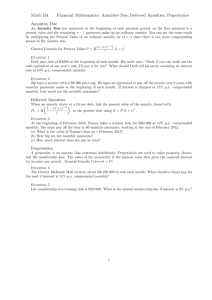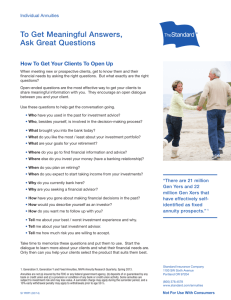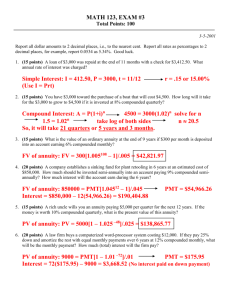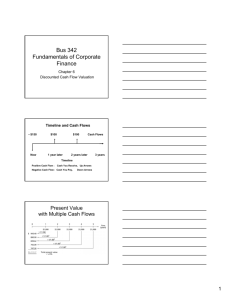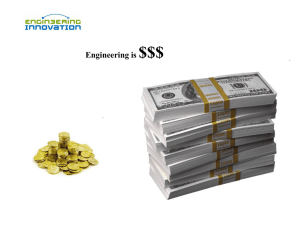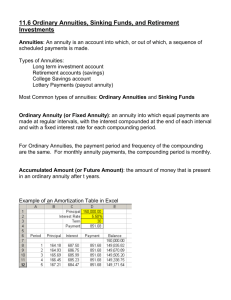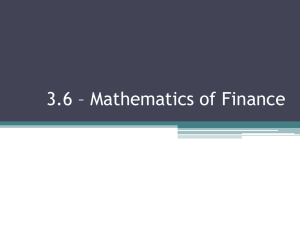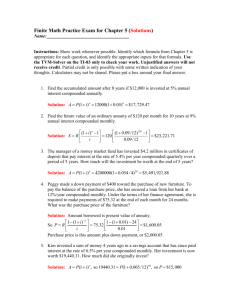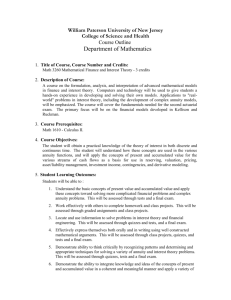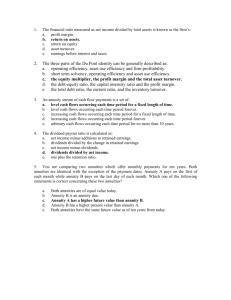Text - McGraw Hill Higher Education
advertisement
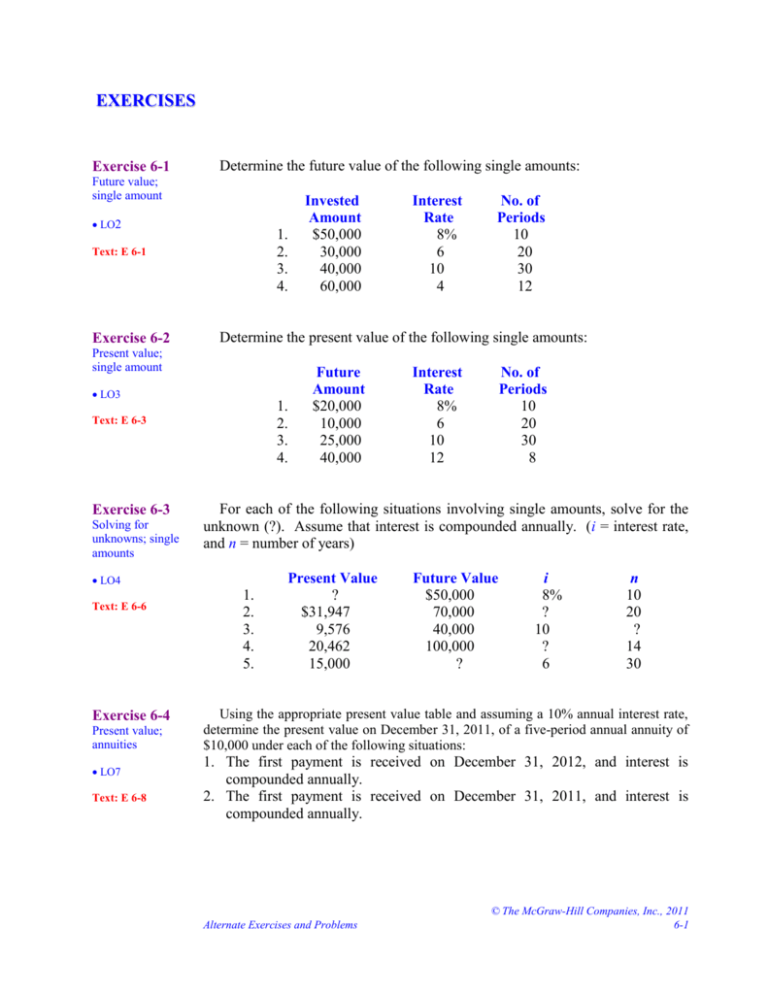
EXERCISES Exercise 6-1 Determine the future value of the following single amounts: Future value; single amount LO2 1. 2. 3. 4. Text: E 6-1 Exercise 6-2 LO3 1. 2. 3. 4. Text: E 6-3 Solving for unknowns; single amounts Exercise 6-4 Present value; annuities LO7 Text: E 6-8 No. of Periods 10 20 30 12 Future Amount $20,000 10,000 25,000 40,000 Interest Rate 8% 6 10 12 No. of Periods 10 20 30 8 For each of the following situations involving single amounts, solve for the unknown (?). Assume that interest is compounded annually. (i = interest rate, and n = number of years) LO4 Text: E 6-6 Interest Rate 8% 6 10 4 Determine the present value of the following single amounts: Present value; single amount Exercise 6-3 Invested Amount $50,000 30,000 40,000 60,000 1. 2. 3. 4. 5. Present Value ? $31,947 9,576 20,462 15,000 Future Value $50,000 70,000 40,000 100,000 ? i 8% ? 10 ? 6 n 10 20 ? 14 30 Using the appropriate present value table and assuming a 10% annual interest rate, determine the present value on December 31, 2011, of a five-period annual annuity of $10,000 under each of the following situations: 1. The first payment is received on December 31, 2012, and interest is compounded annually. 2. The first payment is received on December 31, 2011, and interest is compounded annually. Alternate Exercises and Problems © The McGraw-Hill Companies, Inc., 2011 6-1 Exercise 6-5 Solving for unknowns; annuities For each of the following situations involving annuities, solve for the unknown (?). Assume that interest is compounded annually and that all annuity amounts are received at the end of each period. (i = interest rate, and n = number of years) LO8 Text: E 6-9 1. 2. 3. 4. 5. Exercise 6-6 Deferred annuities; solving for annuity amount LO7 Text: E 6-16 Present Value ? $298,058 337,733 600,000 200,000 Annuity Amount $ 5,000 60,000 30,000 74,435 ? i 10% ? 8 ? 12 n 10 8 ? 15 6 On June 1, 2011, April Smith purchased carpeting from the Wearwell Carpet Company for $4,800. In order to increase sales, Wearwell allows customers to pay in installments and will defer any payments for 12 months. April will make 18 equal monthly payments, beginning June 1, 2012. The annual interest rate implicit in this agreement is 24%. Required: Calculate the monthly payment necessary for April to pay for her purchases. © The McGraw-Hill Companies, Inc., 2011 6-2 Intermediate Accounting, 6/e PROBLEMS Problem 6-1 Present and Future Value LO6 LO7 LO9 Text: P 6-2 Problem 6-2 Deferred annuities LO7 Text: P 6-9 The Reuter Company is facing several decisions regarding investing and financing activities. Address each decision independently. 1. On May 31, 2011, Reuter purchased equipment and agreed to pay the vendor $50,000 on the purchase date and the balance in four annual installments of $20,000 on each May 31 beginning May 31, 2012. Assuming that an interest rate of 8% properly reflects the time value of money in this situation, at what amount should Reuter value the equipment? 2. Reuter needs to accumulate sufficient funds to pay a $600,000 debt that comes due on December 31, 2015. The company will accumulate the funds by making four equal annual deposits to an account paying 4% interest compounded annually. Determine the required annual deposit if the first deposit is made on December 31, 2012. 3. Reuter needs to decide whether to lease or buy an office building. The purchase price of the building would be $2,000,000. If the lease option is chosen, the lease agreement would require 20 annual payments of $200,000 beginning immediately. A 10% interest rate is implicit in the lease agreement. Which option, buy or lease, should Reuter choose? Assume zero residual value if the buy option is chosen. Smokey Sims is 60 years old and has been asked to accept early retirement from his company. The company has offered three alternative compensation packages to induce Smokey to retire: 1. $400,000 cash payment to be paid immediately. 2. A 15-year annuity of $40,000 beginning immediately. 3. A 15-year annuity of $45,000 beginning at age 65. Required: Which alternative should Smokey choose assuming that he is able to invest funds at a 6% rate? Alternate Exercises and Problems © The McGraw-Hill Companies, Inc., 2011 6-3
